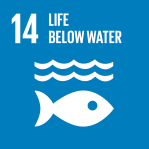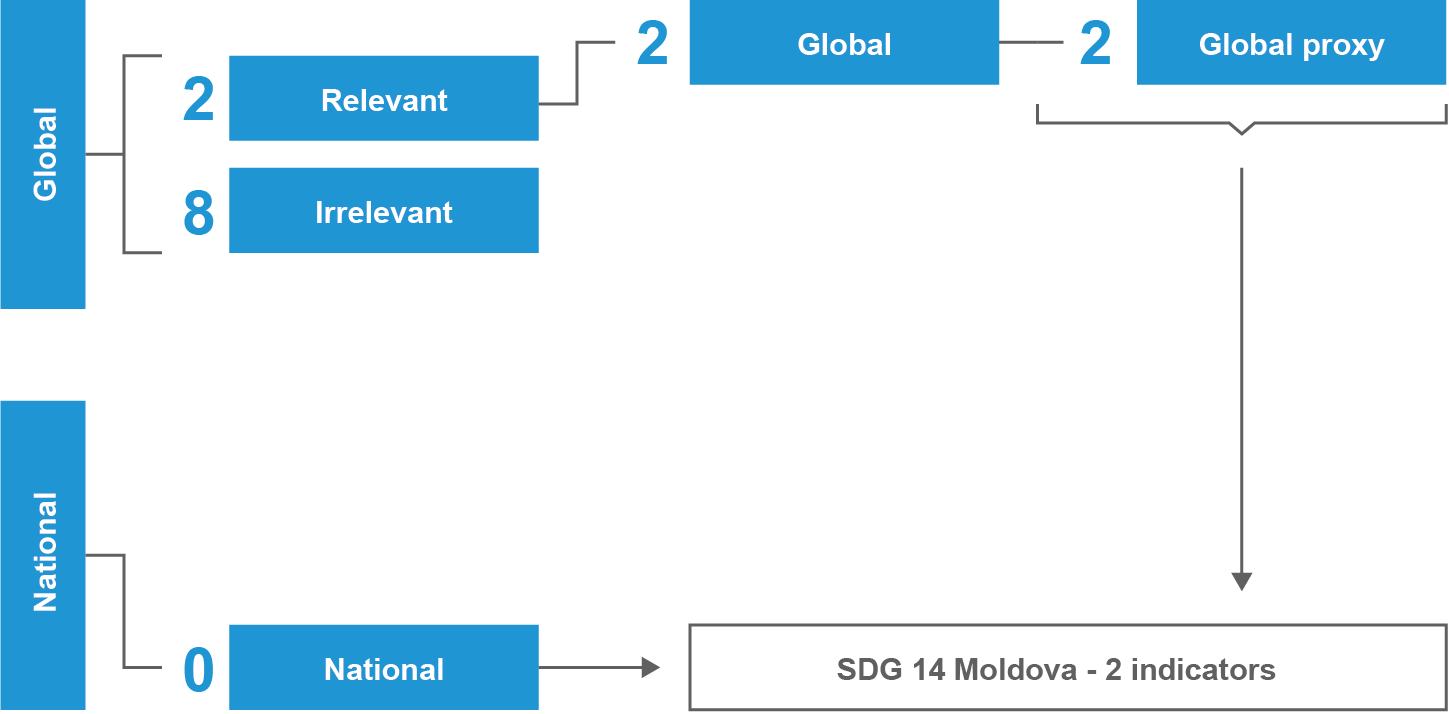Goal 14: Life Below Water
As part of nationalized targets, Moldova should aim to prevent and significantly reduce the pollution of its surface waters, including rivers, from land-based activities. The Nistru river flows directly into the Black Sea, while the Prut river flows into the Danube river. Two of the country’s specific national goals are recovering the river and water basins’ protective forest strips and understanding better and diminishing the anthropic impact on biodiversity caused by alteration of the water flows courses. Also, considering the relatively low level of fish stocks and their high vulnerability to other risks (such as those induced by climate change), the Republic of Moldova aims to prevent overfishing and to eradicate illegal, unregulated and undeclared fishing. |
| Results of indicators nationalization SDG 14
|
Goal 14. Conserve and sustainably use the oceans, seas and marine resources for sustainable development |
|
| Goal 14. Conserve and sustainably use the oceans, seas and marine resources for sustainable development | |
GLOBAL TARGETS 2019 | GLOBAL INDICATORS 2019 |
| NATIONAL TARGETS 2017* | NATIONAL INDICATORS 2017* |
14.1 By 2025, prevent and significantly reduce marine pollution of all kinds, in particular from land-based activities, including marine debris and nutrient pollution | 14.1.1 Index of coastal eutrophication and floating plastic debris density |
| 14.1 By 2025, prevent and significantly reduce surface water pollution, in particular from land-based activities | 14.1.1 Index of coastal eutrophication and floating plastic debris density |
14.2 By 2020, sustainably manage and protect marine and coastal ecosystems to avoid significant adverse impacts, including by strengthening their resilience, and take action for their restoration in order to achieve healthy and productive oceans | 14.2.1 Proportion of national exclusive economic zones managed using ecosystem-based approaches |
| Not relevant | |
14.3 Minimize and address the impacts of ocean acidification, including through enhanced scientific cooperation at all levels | 14.3.1 Average marine acidity (pH) measured at agreed suite of representative sampling stations |
| Not relevant | |
14.4 By 2020, effectively regulate harvesting and end overfishing, illegal, unreported and unregulated fishing and destructive fishing practices and implement science-based management plans, in order to restore fish stocks in the shortest time feasible, at least to levels that can produce maximum sustainable yield as determined by their biological characteristics | 14.4.1 Proportion of fish stocks within biologically sustainable levels |
| 14.4 By 2020, eliminate illegal, unreported and unregulated fishing | 14.4.1 Number of violations registered on illegal fishing |
14.5 By 2020, conserve at least 10 per cent of coastal and marine areas, consistent with national and international law and based on the best available scientific information | 14.5.1 Coverage of protected areas in relation to marine areas |
| Not relevant | |
14.6 By 2020, prohibit certain forms of fisheries subsidies which contribute to overcapacity and overfishing, eliminate subsidies that contribute to illegal, unreported and unregulated fishing and refrain from introducing new such subsidies, recognizing that appropriate and effective special and differential treatment for developing and least developed countries should be an integral part of the World Trade Organization fisheries subsidies negotiation3 | 14.6.1 Progress by countries in the degree of implementation of international instruments aiming to combat illegal, unreported and unregulated fishing |
| Not relevant | |
14.7 By 2030, increase the economic benefits to small island developing States and least developed countries from the sustainable use of marine resources, including through sustainable management of fisheries, aquaculture and tourism | 14.7.1 Sustainable fisheries as a proportion of GDP in small island developing States, least developed countries and all countries |
| Not relevant | |
14.a Increase scientific knowledge, develop research capacity and transfer marine technology, taking into account the Intergovernmental Oceanographic Commission Criteria and Guidelines on the Transfer of Marine Technology, in order to improve ocean health and to enhance the contribution of marine biodiversity to the development of developing countries, in particular small island developing States and least developed countries | 14.a.1 Proportion of total research budget allocated to research in the field of marine technology |
| Not examined | |
14.b Provide access for small-scale artisanal fishers to marine resources and markets | 14.b.1 Progress by countries in the degree of application of a legal/regulatory/policy/institutional framework which recognizes and protects access rights for small-scale fisheries |
| Not examined | |
14.c Enhance the conservation and sustainable use of oceans and their resources by implementing international law as reflected in the United Nations Convention on the Law of the Sea, which provides the legal framework for the conservation and sustainable use of oceans and their resources, as recalled in paragraph 158 of “The future we want” | 14.c.1 Number of countries making progress in ratifying, accepting and implementing through legal, policy and institutional frameworks, ocean-related instruments that implement international law, as reflected in the United Nations Convention on the Law of the Sea, for the conservation and sustainable use of the oceans and their resources |
| Not examined | |
 |  |  |  |  |  |  |  |  |
 |  |  |  |  |  |  |  |  |


 Goal 14: Conserve and sustainably use the oceans, seas and marine resources for sustainable development
Goal 14: Conserve and sustainably use the oceans, seas and marine resources for sustainable development